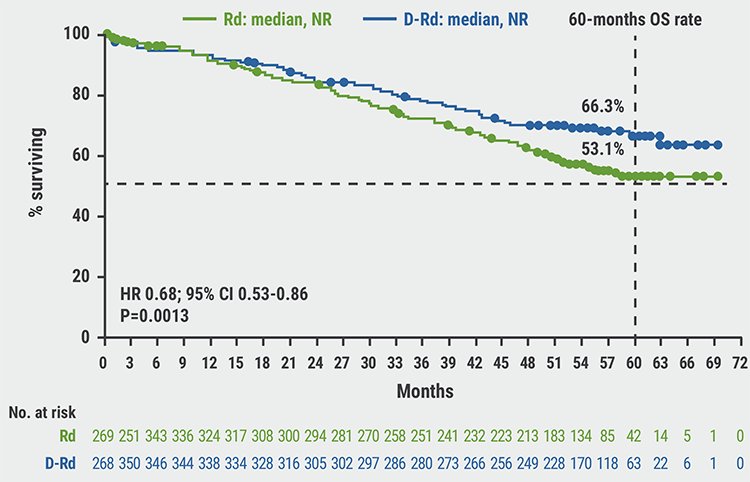Relapse is the most common cause of treatment failure following intensive induction and consolidation therapy in older adults with AML. The prospective, randomised, multicentre, phase 2 ECOG-ACRIN E2906 trial investigated patient outcomes after decitabine maintenance therapy compared with observation in intensively-treated older patients (≥60 years) with AML. Feasibility of decitabine maintenance was previously confirmed in a large phase 2 study [3].
The primary clinical results from the E2906 trial (n=727) demonstrated inferior overall survival of the single-agent clofarabine in comparison with standard daunorubicin and cytarabine (7+3) induction and consolidation therapy. The target accrual of the maintenance portion of the trial (step 3) was n=172, but the accrual was suspended after the recruitment of 120 patients in February 2015 by the data monitoring committee due to superior overall survival observed with standard chemotherapy versus clofarabine.
All patients were in complete remission after consolidation therapy and were randomised to either decitabine 20 mg/m2 days 1-3, every 4 weeks for 1 year (n=59) or an observation arm (n=69). The median age was 69 years (range 60-85), 74% of patients had intermediate-risk cytogenetics, and 96% had an ECOG performance status of 0-1. With a median follow-up of 49.8 months, the disease-free survival was better in the decitabine arm (15.3 months) than the observation arm (8.2 months; HR 0.77; 95% CI 0.50-1.19; P=0.12). Furthermore, the overall survival was superior in the decitabine arm (25.8 months) compared with the observation arm (19.5 months) (HR 0.69; 95% CI 0.43-1.09; P=0.06).
FLT3-ITD status was available for 96 participants, of which 84 were FLT3-ITD-negative (46 participants in the observation arm, and 38 in the decitabine arm). Importantly, the researchers observed a significant association of decitabine maintenance with superior overall survival in the large FLT3-ITD-negative subgroup; the median overall survival of decitabine was 38.3 months versus 25.2 months in the observation arm (P=0.039).
Decitabine had few safety signals and was generally well tolerated, with the exception of 9% grade 3 febrile neutropenia events, with reversible grade 4 cytopenias and no grade 5 events. In conclusion, decitabine maintenance for 1 year was associated with improved overall survival and a trend for a longer disease-free survival. The studies also demonstrated a significant impact on survival for the FLT3-ITD-negative population.
1. Tang X, et al. Abstract 3306, ASH 2019, 7-10 December, Orlando, USA.
2. Foran JM, et al. Abstract 115, ASH 2019, 7-10 December, Orlando, USA.
3. Lübbert M, et al. Haematologica. 2012 Mar;97(3):393-401.
Posted on
Previous Article
« Mosunetuzumab: complete remissions in non-Hodgkin lymphoma Next Article
Arsenic, ATRA, and ascorbic acid in acute promyelocytic leukaemia maintenance »
« Mosunetuzumab: complete remissions in non-Hodgkin lymphoma Next Article
Arsenic, ATRA, and ascorbic acid in acute promyelocytic leukaemia maintenance »
Table of Contents: ASH 2019
Featured articles
Late-Breaking Abstracts
Likely new standard of care: Blinatumomab for children with relapsed B-ALL
Pivotal phase 3 trial in cold agglutinin disease: sutimlimab can stop haemolysis
Oral azacitidine improves overall survival in patients with AML in remission
BCL11A as a novel target in gene therapy for sickle cell disease
Adding daratumumab to carfilzomib/dexamethasone prolongs PFS and OS in R/R MM
Long-term data of ropeginterferon alpha-2b in polycythaemia vera
Anti-CD70 is safe with hypomethylating agents in AML
MRD assessment to guide pre-emptive treatment decisions
Luspatercept effective for myelofibrosis-associated anaemia
Arsenic, ATRA, and ascorbic acid in acute promyelocytic leukaemia maintenance
Updated results ECOG-ACRIN E2906: decitabine maintenance after alloSCT
Sickle Cell Disease
Arginine supplements help against sickle cell disease pain
Abatacept prevents graft-versus-host disease in sickle cell patients after alloSCT
Plenary Scientific Session
HOVON-96: Better outcomes with cyclophosphamide after transplantation
Erythroferrone and skeletal changes associated with thalassaemia
Experimental model for limitations of haematopoietic stem cells propagation
Mosunetuzumab: complete remissions in non-Hodgkin lymphoma
Inclusive Medicine
Socioeconomic disparities and survival in paediatric AML
Oral selinexor/pomalidomide/dexamethasone shows activity in heavily pre-treated multiple myeloma
CAR T-cell therapy successful in older non-Hodgkin’s lymphoma patients
Mild renal impairment in African Americans does not affect OS in AML
ALCYONE: New overall survival results for myeloma
Venous Thromboembolism
Rivaroxaban is safe and effective for paediatric venous thromboembolism
Aspirin plus DOAC is not better than a DOAC alone
20-Year follow-up of imatinib in chronic myeloid leukaemia after failure with interferon
CAR T and Beyond
BCMA-targeted CAR T therapy yields 100% response in relapsed/refractory MM
Anti-BCMA/anti-CD38 in refractory multiple myeloma
© 2024 Medicom Medical Publishers. All rights reserved. Terms and Conditions | Privacy Policy
HEAD OFFICE
Laarderhoogtweg 25
1101 EB Amsterdam
The Netherlands
T: +31 85 4012 560
E: publishers@medicom-publishers.com


